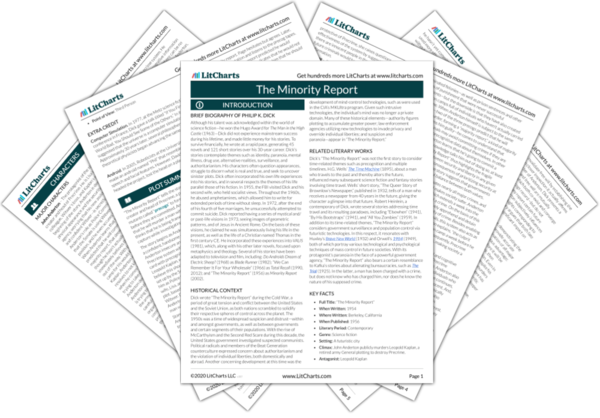In “The Minority Report,” the precogs—three mutants that can predict the future, thus helping police stop crime before it happens—symbolize the dehumanization that can occur within a highly controlled, technological society that values safety over liberty. At the beginning of the story, Anderton gives his new assistant, Witwer, a tour of the Precrime facility. Dick describes the precogs as “almost lost to view in the maze of wiring” that connects them to the computer system. Imprisoned by wiring and clamps, the three precogs lack free will and autonomy, passively relaying precognitive information without understanding it. The precogs' enslavement highlights the dehumanized condition of citizens in Anderton’s society. Would-be-criminals are physically detained in detention camps a week before they’ve even committed a crime, without so much as a warning or a trial, while every citizen’s future is scanned for possible criminal activity. While this system has virtually eradicated crime—there’s only been one murder in the last five years—it also strips citizens of a trial by jury and other personal liberties. Even though these citizens are technically innocent, locked up before they’ve even committed a crime, they’re treated more like monsters rather than human beings.
The precogs also symbolize the average citizen’s mental state, as citizens are kept in the dark regarding the inner workings of the government and police. Dick describes the precogs as “Vegetable-like,” with minds that “[are] dull, confused, lost in shadows.” In regards to the precognitive data they generate, Anderton comments, “They don’t understand any of it, but we do.” This also holds true for the members society, who do not fully understand the technological apparatus that has a potentially absolute power over their fate—only the higher-ups at Precrime and in the army have a keen understanding of how the precogs work. Citizens thus do not grasp the significance of the minority report—a kind of majority rule when two out of the three precogs deem someone guilty of a future crime, thus marking a person eligible to be sent to a detention camp. While Kaplan, a retired army general, seeks to exploit this widespread ignorance in order to destroy Precrime and gain more power for the army, Anderton does everything in his power to make sure that Precrime stays credible in the public consciousness. Given the ease with which the two powerful men are able to manipulate public perceptions of Precrime and the precogs, the reader is left to wonder if the public in this story has not become somewhat like the unaware precogs: playthings in the hands of unaccountable authority figures.
Precogs Quotes in The Minority Report
“…unanimity of all three precogs is a hoped-for but seldom-achieved phenomenon, acting-Commissioner Witwer explains. It is much more common to obtain a collaborative majority report of two precogs, plus a minority report of some slight variation, usually with reference to time and place, from the third mutant. This is explained by the theory of multiple-futures. If only one time-path existed, precognitive information would be of no importance, since no possibility would exist, in possessing this information, of altering the future.”
“Perhaps a lot of the people in the camps are like you.”
“No,” Anderton insisted. But he was beginning to feel uneasy about it, too. “I was in a position to see the card, to get a look at the report. That’s what did it.”
“But—” Lisa gestured significantly. “Perhaps all of them would have reacted that way. We could have told them the truth.”
“It would have been too great a risk,” he answered stubbornly.
“You’ve convinced me that you’re innocent. I mean, it’s obvious that you won’t commit a murder. But you must realize now that the original report, the majority report, was not a fake. Nobody falsified it. Ed Witwer didn’t create it. There’s no plot against you, and there never was. If you’re going to accept this minority report as genuine you’ll have to accept the majority one, also.”
“But there can be no valid knowledge about the future. As soon as precognitive information is obtained, it cancels itself out. The assertion that this man will commit a future crime is paradoxical. The very act of possessing this data renders it spurious. In every case, without exception, the report of the three police precogs has invalidated their own data. If no arrests had been made, there would still have been no crimes committed.”
“Each report was different,” Anderton concluded. “Each was unique. But two of them agreed on one point. If left free, I would kill Kaplan. That created the illusion of a majority report. Actually, that’s all it was—an illusion. ‘Donna’ and ‘Mike’ previewed the same event—but in two totally different time-paths, occurring under totally different situations.”












